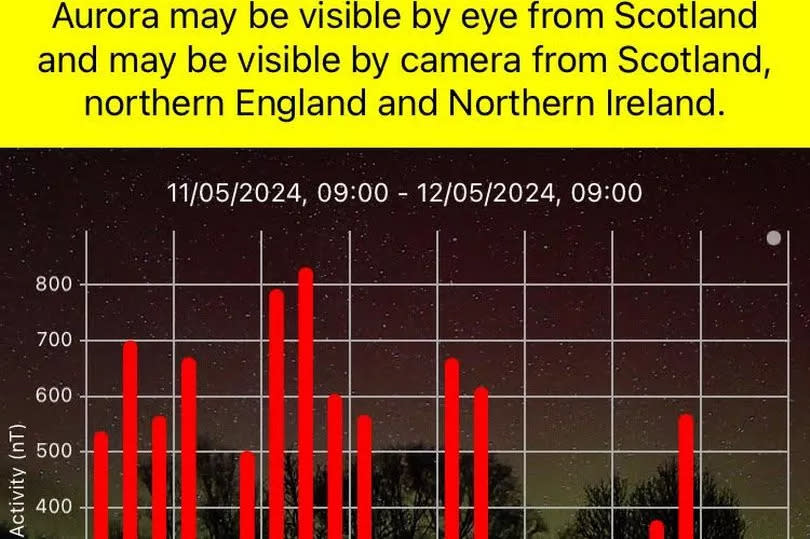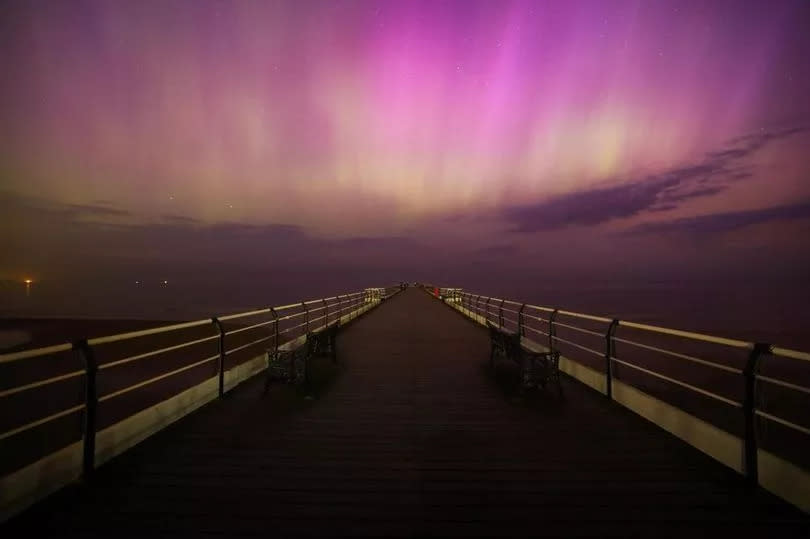Northern Lights could return for third night in a row as yellow alert issued
The Northern Lights could grace the skies above the UK for a third consecutive night, following another geomagnetic storm, according to weather experts.
The skies have been filled with eerie green and pink bands of light with it being visible, especially on Friday night, over the whole of the UK.
Channel 4's weather presenter Liam Dutton took to Twitter with an update: "LATEST NOAA SPACE PREDICTION. Further coronal mass ejections (CMEs) expected to arrive on Sunday. This means another strong or extreme geomagnetic storm is likely."
He continued: "Therefore, there may be another UK-wide showing of the aurora borealis on Sunday night - cloud permitting." Dutton also mentioned: "Geomagnetic activity will increase again today, however, as with last night, peak activity may not coincide with darkness."
Adding to the anticipation, he noted: "There'll also be much more cloud around tonight, with clear spells limited. So, the chances of spotting the [aurora] will be reduced somewhat.", reports Wales Online.
AuroraWatch UK, operated by the Space and Planetary Physics group at Lancaster University, issued a yellow alert this morning. They suggest that the aurora could be visible to the naked eye in some areas and more widely through camera equipment.
AuroraWatch UK provides a free service that alerts when the aurora might be seen from the UK. There's an app available in your phone's App store named AuroraWatch UK Aurora Alerts. By downloading it, you'll receive a notification on your phone when there's activity likely to result in the northern lights.

This past weekend, the Northern Lights, also known as aurora borealis, made an appearance after the Met Office issued a rare severe geomagnetic storm warning for this weekend the first in nearly two decades. The lights were first spotted on Friday night with thousands of people capturing the beautiful skies - you can view some of those stunning photos here.
For those who missed it on Friday, the phenomenon returned on Saturday giving stargazers another chance - and it seems like it's set to return again. The US National Oceanic and Atmospheric Administration (NOAA) reported that the earth was struck by a G5 geomagnetic storm on Thursday. A G5 rating is categorised as "extreme" and represents the highest level of solar storm.

This storm was caused by a "large, complex" sunspot cluster, 17 times the diameter of Earth. The last storm with a G5 rating impacted Earth over 20 years ago in October 2003 and resulted in power outages in Sweden. Every 11 years, the sun's poles flip, leading to bursts of solar activity that produce northern lights.
Scientists predict the next solar maximum will take place at the end of 2024.

 Yahoo News
Yahoo News 
